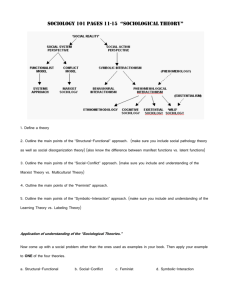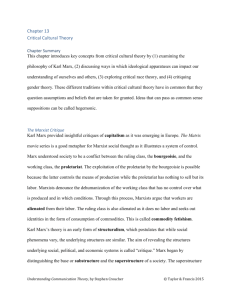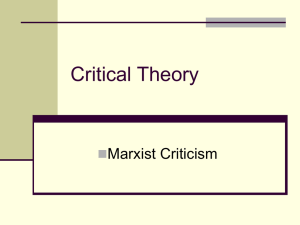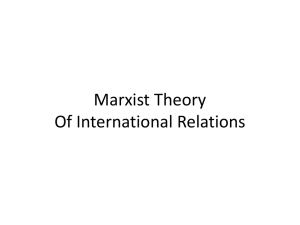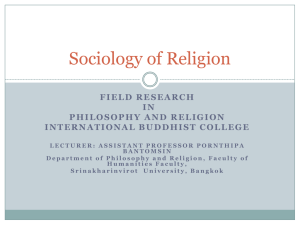Sociological & Marxist Literary Criticism
advertisement
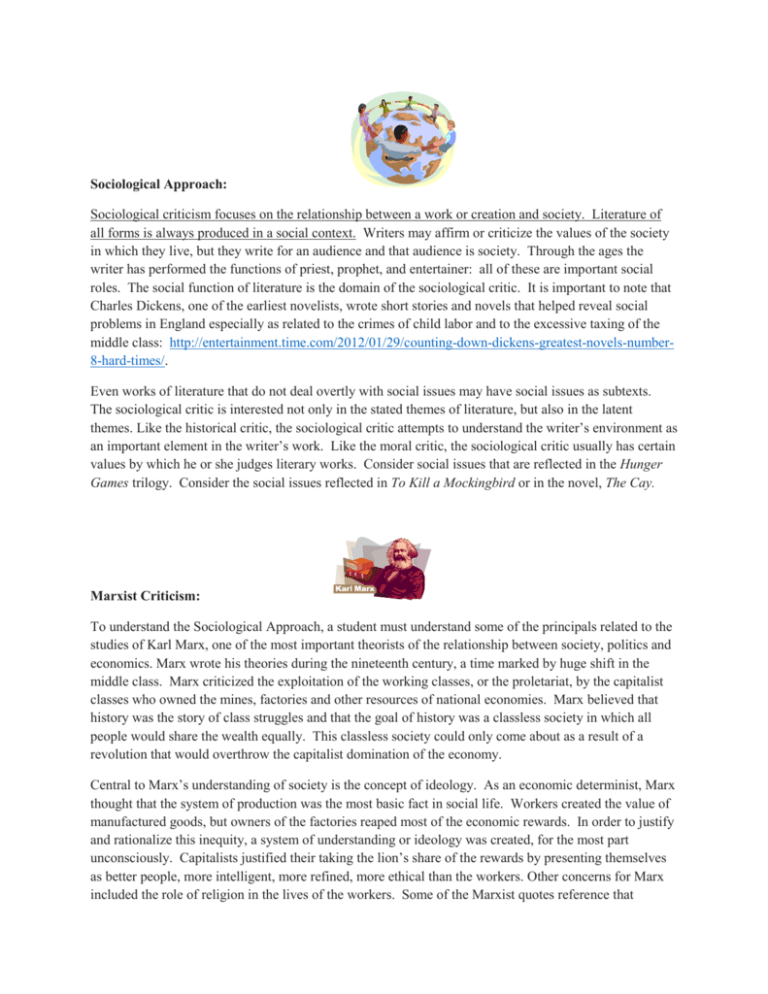
Sociological Approach: Sociological criticism focuses on the relationship between a work or creation and society. Literature of all forms is always produced in a social context. Writers may affirm or criticize the values of the society in which they live, but they write for an audience and that audience is society. Through the ages the writer has performed the functions of priest, prophet, and entertainer: all of these are important social roles. The social function of literature is the domain of the sociological critic. It is important to note that Charles Dickens, one of the earliest novelists, wrote short stories and novels that helped reveal social problems in England especially as related to the crimes of child labor and to the excessive taxing of the middle class: http://entertainment.time.com/2012/01/29/counting-down-dickens-greatest-novels-number8-hard-times/. Even works of literature that do not deal overtly with social issues may have social issues as subtexts. The sociological critic is interested not only in the stated themes of literature, but also in the latent themes. Like the historical critic, the sociological critic attempts to understand the writer’s environment as an important element in the writer’s work. Like the moral critic, the sociological critic usually has certain values by which he or she judges literary works. Consider social issues that are reflected in the Hunger Games trilogy. Consider the social issues reflected in To Kill a Mockingbird or in the novel, The Cay. Marxist Criticism: To understand the Sociological Approach, a student must understand some of the principals related to the studies of Karl Marx, one of the most important theorists of the relationship between society, politics and economics. Marx wrote his theories during the nineteenth century, a time marked by huge shift in the middle class. Marx criticized the exploitation of the working classes, or the proletariat, by the capitalist classes who owned the mines, factories and other resources of national economies. Marx believed that history was the story of class struggles and that the goal of history was a classless society in which all people would share the wealth equally. This classless society could only come about as a result of a revolution that would overthrow the capitalist domination of the economy. Central to Marx’s understanding of society is the concept of ideology. As an economic determinist, Marx thought that the system of production was the most basic fact in social life. Workers created the value of manufactured goods, but owners of the factories reaped most of the economic rewards. In order to justify and rationalize this inequity, a system of understanding or ideology was created, for the most part unconsciously. Capitalists justified their taking the lion’s share of the rewards by presenting themselves as better people, more intelligent, more refined, more ethical than the workers. Other concerns for Marx included the role of religion in the lives of the workers. Some of the Marxist quotes reference that religion, any religion, has a tendency to make the worker complacent. He was known to say that people make religion and that religion does not make a people. He also described religion as the opiate of the people. Marx had other significant comments for journalism and the media. He felt that the agents of media could create a “false consciousness” meaning that the media could create reality or truth even if it was false. He was suspicious of large government institutions and felt that government agencies may be in place to support the upper class in society. Thus, Marx was an advocate for common man. When Marxist theory is applied, it looks at how the role of the common man/woman is presented and the struggles they face. Consider this poem by Langston Hughes. How does Hughes show the struggles of the tenant? Ballad of a Landlord Landlord, landlord, My roof has sprung a leak. Don't you 'member I told you about it Way last week? Landlord, landlord, These steps is broken down. When you come up yourself It's a wonder you don't fall down. Ten Bucks you say I owe you? Ten Bucks you say is due? Well, that's Ten Bucks more'n I'l pay you Till you fix this house up new. What? You gonna get eviction orders? You gonna cut off my heat? You gonna take my furniture and Throw it in the street? Um-huh! You talking high and mighty. Talk on-till you get through. You ain't gonna be able to say a word If I land my fist on you. Police! Police! Come and get this man! He's trying to ruin the government And overturn the land! Copper's whistle! Patrol bell! Arrest. Precinct Station. Iron cell. Headlines in press: MAN THREATENS LANDLORD TENANT HELD NO BAIL JUDGE GIVES NEGRO 90 DAYS IN COUNTY JAIL! Consider the uniqueness of each stanza? Why is one stanza italicized? Why is the last stanza in all capital letters? Use Marxist theory to interpret the poem. As you consider the Sociological Approach, keep in mind that Marxist theory is one narrow approach to a broad approach that essentially deals with the relationship between people in society and branches of society. Let these questions guide your analysis of literature. Common Questions for the Sociological Approach: What is the relationship between the characters and their society? Does the story address societal issues, such as race, gender, and class? How does the story reflect the Great American Dream? How does the story reflect urban, rural, or suburban values? How do social forces shape the power relationships between groups or classes of people in the story? Who has the power, and who doesn’t? Why? What does the work say about economic or social power? Who has it and who doesn’t? Any Marxist leanings evident? Does the story address issues of economic exploitation? What role does money play? How do economic conditions determine the direction of the characters’ lives? Does the work challenge or affirm the social order it depicts? Can the protagonist’s struggle be seen as symbolic of a larger class struggle? How does the microcosm (small world) of the story reflect the macrocosm (large world) of the society in which it was composed? Do any of the characters correspond to types of government, such as a dictatorship, democracy, communism, socialism, fascism, etc.? What attitudes toward these political structures/systems are expressed in the work?
